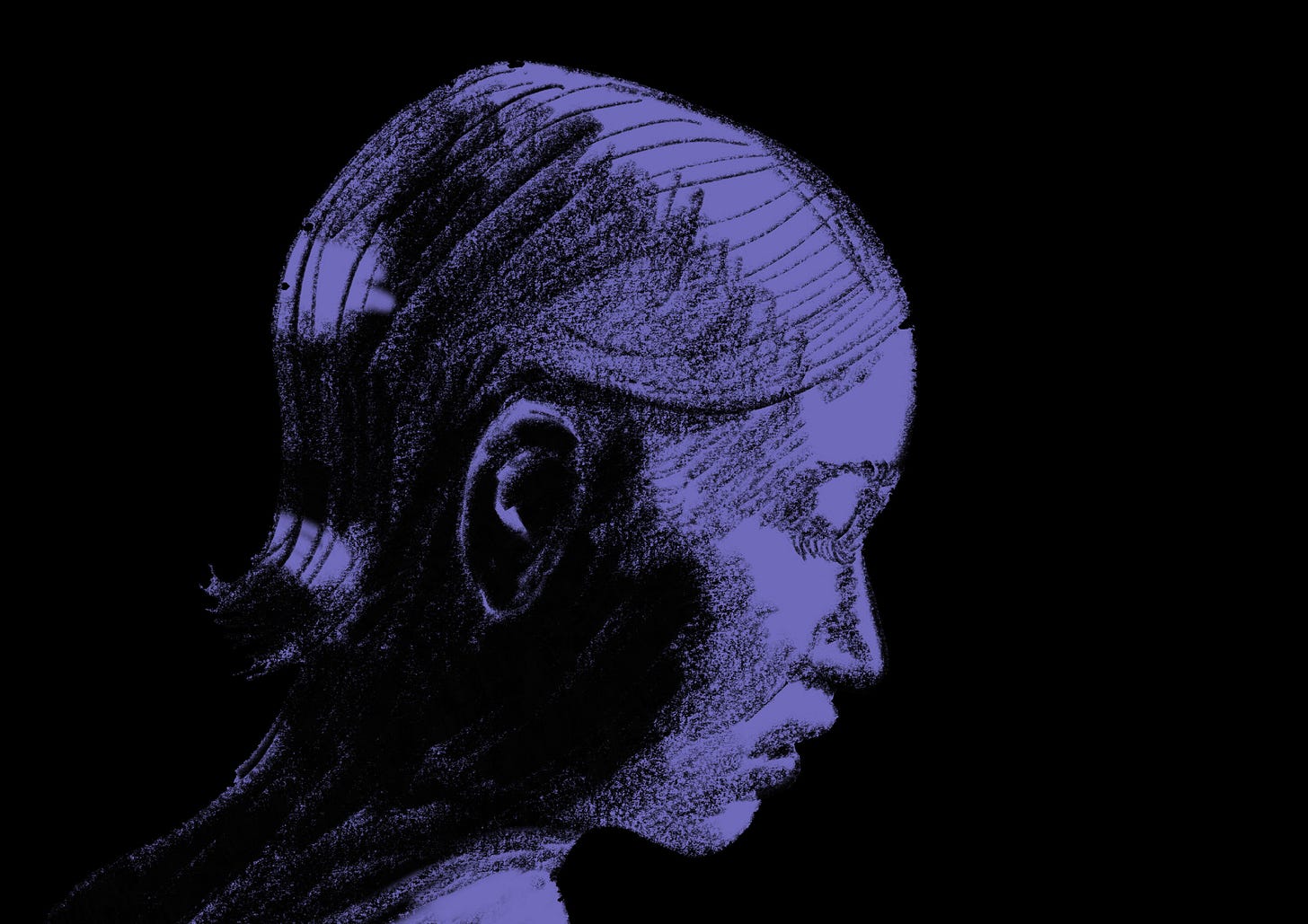
This is my ongoing scifi / fantasy / crime fiction serial. New chapter every week.
The Triverse is
Mid-Earth, an alternate 1980s 1970s London
Max-Earth, a vision of the 26th century
Palinor, where magic is real
Previously: Lola Styles has been in a coma for months, following a violent attack…
The Appilan Rainforest. Palinor.
3203. Early Frostfield.
There was a distance between Lola Styles and her body, and in-between was a dense fog. She was a remote puppeteer, awkwardly manipulating her limbs, tugging on the strands and expecting movement. Resolutely, she would not move. Her awareness drifted back and forth, never awake, never asleep, and, no matter how she willed her body to respond, she remained trapped. There was no comprehension of time, or of place. Only her body, stripped of movement, held in place by its own seemingly infinite inertia, suspended in nowhere while she screamed soundlessly at no-one.
Slowly, ever so slowly, she drew nearer to herself, tugging on the strings, closing in on her flesh and bone. It made for an uncomfortable skin, as if she were wearing a suit that was too tight. She was inside herself, no longer a distant and useless manipulator, but still she could not move, or see, or hear, or feel. Had she lost her way? Or had it been taken from her? No memories were within reach that made sense. She was Lola Styles. She was a detective. She wasn’t at home. The rest was in the fog.
After lingering in the nothing space long enough to have forgotten all else, the moment came when she opened her eyes. It wasn’t a startling awakening, but a slow, gentle lifting of tired eyelids, which felt almost too heavy to shift. Patterns of mottled green and yellow and red and blue shifted before her, a garish impressionist painting. She shut her eyes, tired from the effort, and began descending again into the grey absence.
Not this time, though. She willed her eyes to open again, and this time saw leaves and branches, of trees high above, while beneath her was a cushioning embrace. Was she in bed? Had she been asleep? It made her think of camping in the woods in Devon, a memory so vivid that it shook her further from her stupor. The tent had never quite worked, one of the corners always coming loose. Her father had kept hammering it back into the soft earth, had covered it with heavy books and the spare tyre, but every night it had shaken itself loose. Bacon wafting on the air, breakfast serving as an olfactory alarm clock to wake her and her sister. Their parents let them scamper in those woods, back then, which seemed unusual. They’d always been so cautious about letting them walk home from school, or get the bus, always warning them to steer clear of aen’fa routes and koth dens. The one time Lola had got into an actual fight, it had been with a couple of human kids from school. In the woods they invented mysteries to solve, ancient crimes to uncover, dancing around the ruins of old cottages and overgrown castles. She’d been fourteen, the last time they’d all gone camping together. Something had changed after that, her parents always sniping at each other, and mealtimes awkward and tense.
As she stared up at the trees, her brain began to piece her life back together, memory after memory, sensation after sensation. Leaving home, going to university in Norwich, joining the police, moving to London, studying hard, on the beat, passing her exams, becoming a detective, convincing them to transfer her to the Specialist Dimensional Command when a space opened up on the team. Meeting Detective Clarke — Yannick. And Nisha, and Zoltan, and Andrew, and Robin. The first time she’d met Dr Wong, with his childlike glee at cutting open a corpse like a child unwrapping a present on Christmas day.
Lola took a deep, gulping breath, and a noise escaped from her mouth, popping into the air like a bubble. Her throat was dry and felt as if it would crack in two if she tried to speak. She still couldn’t move, and all she wanted to do was call out.
A shadow, and then a figure stood above her. It wasn’t Clarke, or any of the others. Who was it? It was a girl, young, short, with pointed ears and wild tufts of coloured hair. An aen’fa? Where was she?
“Lola?” the girl asked, leaning over, incredulous. “Lola, are you awake?” A wide grin spread over the girl’s face. She touched Lola’s shoulder, then her forehead, the sensation coursing through Lola. For the first time in a long while, she felt alive. “It’s OK,” the aen’fa said, “don’t try to move. I’ll get the others.”
She turned away, and Lola wanted to scream don’t go.
“Hey!” the aen’fa shouted, jumping up and down and waving her arms. “Hey! Everyone, come quickly! Lola’s awake!” The noise echoed in Lola’s ears, the sound beating back and forth from one ear to the other, as if someone were boxing the sides of her head.
The girl’s name was Zlati. She remembered, dimly, and realised then that she wasn’t on Mid-Earth. She was on Palinor, and she’d been in trouble, somehow.
Others were there, surrounding her on all sides, talking excitedly, so fast that she couldn’t make out the words.
“Help her up,” someone said, “gently now, just so she can sit up.” It sounded like Yana, though Lola couldn’t quite remember who Yana was.
Arms gripped her under her shoulders and on the back of her head, and she was lifted upright, her body fighting them all the way, her joints creaking. The world tilted, the trees rotating out of view, and then she saw the camp, and knew for certain that she wasn’t in a forest in south-west England. It was a rainforest, and this was the Owkehu camp.
“Lola,” said a voice, and then she was being hugged, and supported so that she didn’t fall back down, and the voice continued. “You’ve come back,” the woman said, “you’ve come back to us. I’ve missed you. Lola Styles, I love you.” The face of the speaker came into focus: light brown skin, a row of studs running around the edge of one ear, painted pale lips, dark markings tattooed on her neck, a prominent nose and strong jaw. She was called Daryla.
Yes, of course she was Daryla.
“Daryla,” Lola tried to say, but it came out garbled. Her face felt too heavy.
“There’s no rush,” Daryla said, her face lined with tears. She couldn’t stop smiling. “We’ve got you.” She leaned in again, wrapping her arms around Lola, an embrace that meant safety. Lola had little choice in the matter, but allowed her body to rest into the crook of Daryla’s neck, thrilling to the sensitivity. Her senses had been starved and were now entirely overwhelmed.
Piece by piece, Lola was coming back to life. The thrumming in her ears subsided. She could feel her legs, spiking pins and needles running up and down them as she tentatively wiggled her toes. Her fingers twitched, and she could almost lift her arms to hug Daryla in return. Happy faces stood all around, and she recognised them one-by-one. Yana, Slava, Maxim, Zlati. Their expressions gave her even more determination, and so she managed a painful smile.
Daryla staggered against her, groaning, and they nearly both fell back onto the camp bed. She moved away from Lola, still holding her, but a look of dismay on her face. Not only that, but her complexion had greyed, veins visible around her temples. “Yana,” Daryla said, glancing helplessly at the other woman as she stood and took a step away.
Zlati darted forward and caught Lola, laying her back down gently, until her view was once again of the tree canopy.
“What—” Lola managed to say, her tongue swollen and lazy.
“It’s happening again,” she heard Daryla say, then there was the sound of someone collapsing to the ground.
“What?” Lola repeated, unable to turn her head.
The happy faces had shifted to barely-disguised horror, her friends staring at her as if she were a monster.
Trapped once again, still unable to move properly, Lola rocked side-to-side on her back, wailing, wanting for nothing more than to slip back into the nothingness.
References
Lola mentions arriving at the SDC, which happened in ‘Traffic: part 1’ (October 2021).
The mention of Dr Steven Wong links back to a scene from ‘The creature’ (February 2022).
Meanwhile.
We’d never watched The Traitors before. I’d seen glowing reviews, but it smelled of a reality TV show, and I absolutely cannot stand reality TV shows.
This year, we decided to give it a go. Surprise surprise…it’s very good. Despite being about betrayal, it treads a careful line of never being overtly cruel or nasty, and someone manages to maintain a wholesome tone while everyone proceeds to stab each other in the back.
As such, this article from
was a delight:It’s less about The Traitors specifically, and more about constructing effective stories, in particular mysteries and crime fiction, and how foreshadowing ties everything together.
This bit:
“This could be called The Kierkegaard Edit, I suppose, after the Danish philosopher’s observation: “Life can only be understood backwards, but it must be lived forwards.” The magic trick is that we watch or read narrative in one direction, in real time, while the author of that narrative has the ability to travel freely within the story and set things up.”
I knew this already, to a degree, and instinctively, but Joel puts it into words in such a concise way.
This piece by
I suspect speaks to a fair number of us:Right, time is ticking by, so let’s do some quick notes…
Author notes
Triverse is quite different to my previous books. Thematically it goes to some similar places, but tonally, structurally, it’s a very different beast. That’s most evident in the pacing.
The episodic structure of my previous books leaned heavily into forward momentum. Each chapter had its own title, and moved the story forward a significant chunk. They’re pacey adventures.
Triverse moved away from that, with long-running storylines broken into multiple parts. It probably makes sense to think of ‘The Vanishing Star’ as an ‘episode’, which is then broken down into multiple parts and put out as individual posts. A result is that everything has slowed down, which is how we can end up with chapters like today’s, in which basically nothing happens — at least from a plot perspective.
This is all about Lola’s interiority, and her own battle, and her past and present. Getting to a point as a writer where I felt sufficiently confident to attempt chapters like this took me many years. I’d never have dared with A Day of Faces or The Mechanical Crown, where it’s all about that thrusting forward of the story.
Triverse is somewhat more grown-up, in a way, and I trust readers to get something from a chapter beyond mere plot progression.
An interesting question is how I’d restructure things if I were to edit the finished Triverse into the novel format. Retaining the individual parts wouldn’t make sense, as that was primarily dictated by the serial publishing form. For example, I might take all of the parts of ‘The Vanishing Star’ and combine them into a single, longer chapter for the novel. I think that would be interesting, and would shift the feel of the pacing, even if the text remained otherwise unchanged.
Something to think about for the future.
Right, signing off for today. Thanks for reading, as ever.




















Some lovely descriptions of Lola's subjective sensations in her coma, and a little bit of backstory with her flashbacks. One might assume Lola parents eventually divorced...
While you say nothing happens in terms of forward plot momentum, this isn't quite true, as, of course, at the end we have the "...it's happening again..." while people pass out. So we now have a new narrative mystery to look forward to. WHAT is happening again?
This would have been a perfectly satisfying chapter with just Lola's flashbacks, waking up, and, of course, Daryla's loud and public "I love you, Lola Styles," but, yes, there is true narrative motion - even if just in a couple lines of set up. Don't sell yourself short. Set up and spin off are vital narrative techniques.